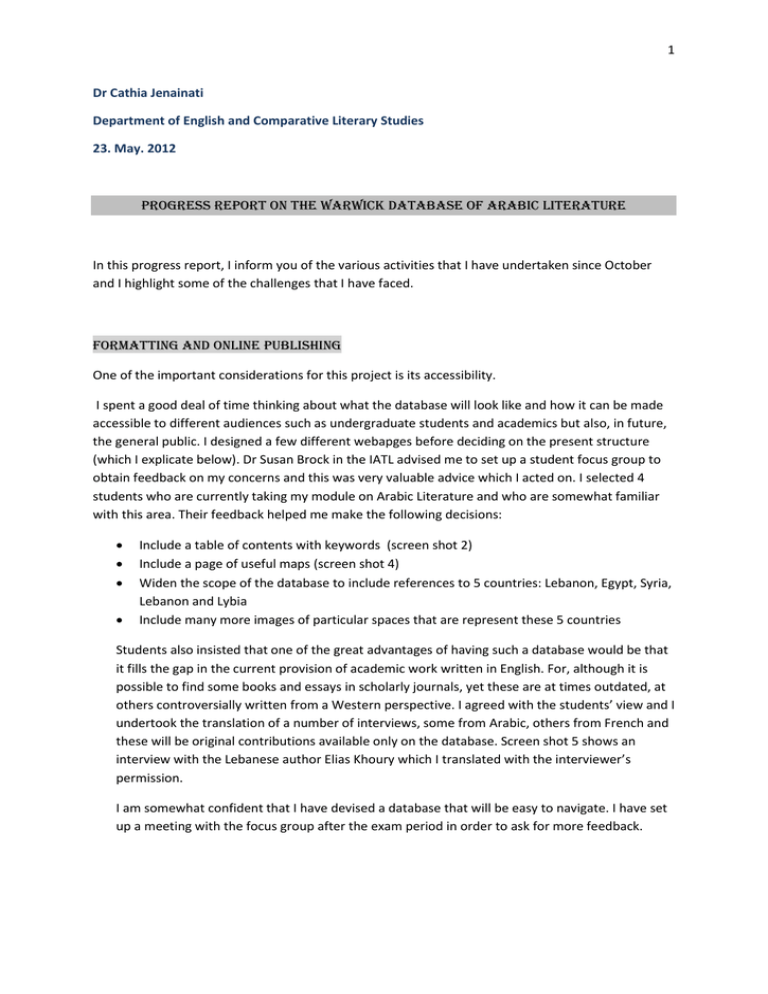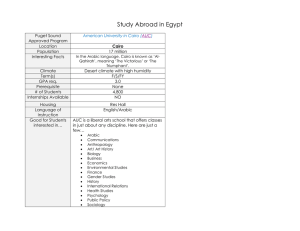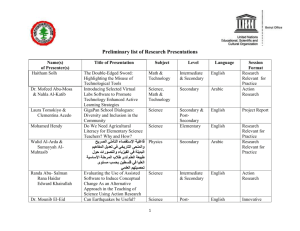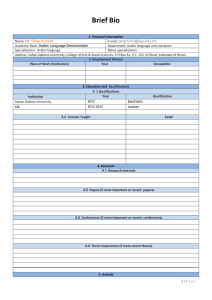1 Progress Report on the Warwick Database of Arabic Literature
advertisement

1 Dr Cathia Jenainati Department of English and Comparative Literary Studies 23. May. 2012 Progress Report on the Warwick Database of Arabic Literature In this progress report, I inform you of the various activities that I have undertaken since October and I highlight some of the challenges that I have faced. Formatting and Online Publishing One of the important considerations for this project is its accessibility. I spent a good deal of time thinking about what the database will look like and how it can be made accessible to different audiences such as undergraduate students and academics but also, in future, the general public. I designed a few different webapges before deciding on the present structure (which I explicate below). Dr Susan Brock in the IATL advised me to set up a student focus group to obtain feedback on my concerns and this was very valuable advice which I acted on. I selected 4 students who are currently taking my module on Arabic Literature and who are somewhat familiar with this area. Their feedback helped me make the following decisions: Include a table of contents with keywords (screen shot 2) Include a page of useful maps (screen shot 4) Widen the scope of the database to include references to 5 countries: Lebanon, Egypt, Syria, Lebanon and Lybia Include many more images of particular spaces that are represent these 5 countries Students also insisted that one of the great advantages of having such a database would be that it fills the gap in the current provision of academic work written in English. For, although it is possible to find some books and essays in scholarly journals, yet these are at times outdated, at others controversially written from a Western perspective. I agreed with the students’ view and I undertook the translation of a number of interviews, some from Arabic, others from French and these will be original contributions available only on the database. Screen shot 5 shows an interview with the Lebanese author Elias Khoury which I translated with the interviewer’s permission. I am somewhat confident that I have devised a database that will be easy to navigate. I have set up a meeting with the focus group after the exam period in order to ask for more feedback. 2 Research and Data Collection Another important consideration has to do with the content of the database. I hope to offer a set of online resources which facilitate the study of Arabic literature and enable me to teach a wide range of texts (poetry, fiction, drama) with reference to relevant contexts. To this end, I will populate the database with contextual information but, most importantly, I will include original research. In my funding application I explained that I was planning to undertake a research trip to the National Library of Cairo and I also wanted to conduct field research in the desert of the Arabian Peninsula to collect information on the Tuareg tribes in Lybia. I also planned to travel to the American University of Beirut, the library of which carries an extensive range of sources. The purpose of these trips was to collect original material for scanning, annotating and posting online. Unfortunately, 2 factors thwarted these plans: the unstable political climate in Egypt, Lybia and Lebanon and the heavy teaching load I was given in the English department which did not allow me any time to be offcampus. I intend to remedy the situation by undertaking the research trip to Cairo and Lebanon in September. I have made some connections with librarians and academics at the University of Cairo and the American University of Beirut and they have offered to give me access to the stacks and archives. In the meantime, I have written 18 critical essays which I will edit and publish online. Intellectual property I have been very careful with regards to using material that is available online. Whatever I have used to date has been cleared by the copyright holders or else it’s available online without a clear indication of ownership. The issue I face though has to do with making the database public, in future. At the moment, copyright holders agree to allow me to use their material because it’s in a non-profit, education setting. What happens when we make the database public is a question that I need to explore in more depth. Student contribution I have benefitted a great deal from having students on a focus group to offer ideas and suggestions for the database. I intend to acknowledge their contribution, of course but I also wish to work with students more closely in the coming year in a more “formalised” structure. For example, next year I will have a new PhD student from Egypt who will be working on translations of Medieval Arabic poems. I will be teaching a new module on Arabic literature for the MA in world literature degree and I will carry on teaching the undergraduate module on Arabic literature. I would like to involve more students with the database because I think that, once the infrastructure is in place, the content can be provided by various levels of researchers. To this end, I have agreed to work with Peter Larkin on the student as research initiative that the library launched recently. I hope to link this project to the Warwick DAR and recruit a strong body of student researchers as contributors. 3 Practical challenges Time: I regret to say that my teaching workload has been huge this year and that, although I was “technically” released from my duties on the Academic writing programme (which counted for 50% of my workload) I was given a great deal of teaching on the English degree. As a result, I have been working late nights, weekends and bank holiday to ensure that my IATL-funded project does not suffer. Expertise and technical know-how: I am aware that there is technical support available at the IATL but, in my experience, this was not helpful. I have remedied this problem by asking personal friends with experience of web-publishing. In retrospect, I wish I had put in the budget breakdown a specific amount of money for buying-in technical help. I should also add that the computer I use in the English department, and which is new, is not suitable for the type of work I wanted to do on this database. It would appear that departments buy computers with the lowest specifications possible. For example, my computer does have an in-built camera, it has no speakers, it lacks “Windows Movie Maker” and has little memory. Although the IATL team lent me a camera, I was still not able to record podcasts because there was no microphone. Consequently, I spent my own money on a new home computer which has the necessary requirements. The new moodle: The university has recently announced that we will have a VLE up and running in September. I have tried to have conversations with colleagues in IT services about the extent to which the work I am doing on the database will / will not be affected by the introduction of moodle. I am sorry to say that no one seems to have an answer. This issue is at the back of my mind although I wonder if the IATL technical team may be able to offer advice. Conclusion Constructing this database is very important for my teaching and for my students’ learning. I have found some challenges while setting up the framework of the database and I have been under pressure to find time to work on it. However, I am content with what I have completed thus far, especially since I have a great deal of material that is simply waiting to be put online. In a way, I feel that the difficult period has passed. In a few weeks’ time the summer term will end and I will be so pleased to devote June, July, August and September to populating this database. At present, I feel confident that by October, I will have a working database that can be used in the next academic year for teaching undergraduate and graduate modules. I have already begun to explore funding sources to support the continuing expansion of this database and I think that the collaboration with the library will be invaluable in engaging even more students with this project. 4 Screen Shot 1: Welcome page Screen Shot 2: Table of contents 5 Screen Shot 3: Transliteration Screen Shot4: Maps (LINK) 6 Screen Shot 5: Interview with Elias Khoury (translated for DAR) Screen Shot6: Fiction contents page 7 Screen Shot7: typical fiction page (LINK)




